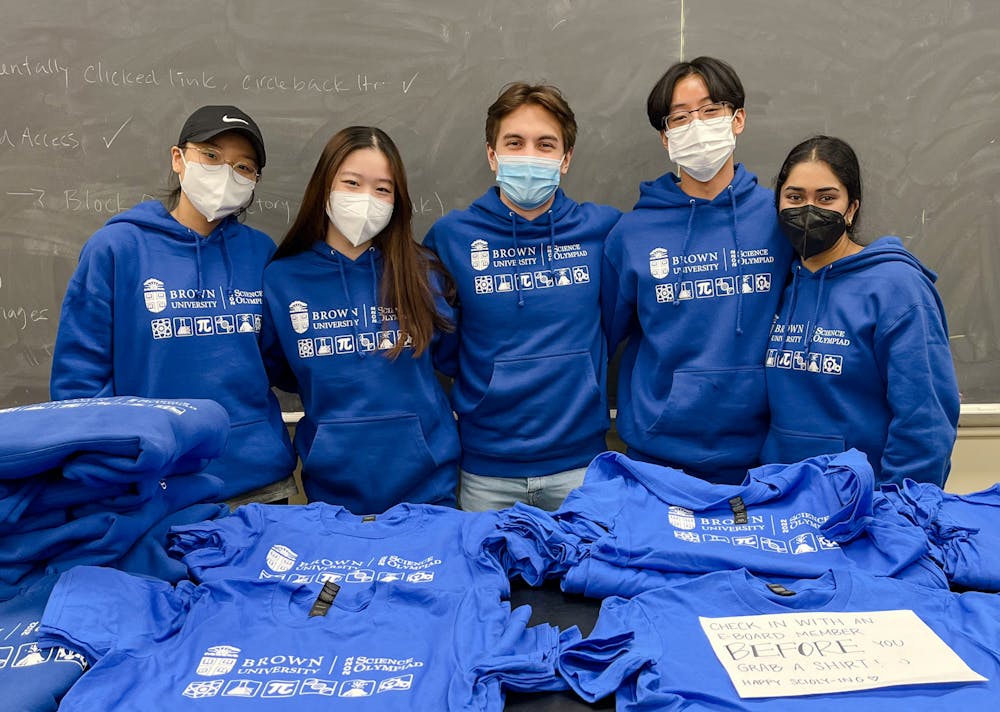Brown Science Olympiad gathered volunteers, event supervisors and Executive Board members Feb. 12 to run an invitational tournament they had been planning since September.
BSO’s invitational is an opportunity for Division C teams — students from ninth to 12th grade — to get practice competing in events without the stress and pressure of a state or national tournament, said BSO Co-Director Nick Sawicki ’23.
The club invited 40 to 50 teams from Rhode Island and other states in New England and beyond to participate virtually in the tournament, Sawicki said, which allowed students to compete in various events covering a range of scientific subjects.
While BSO usually invites teams to compete in-person — occupying classroom spaces around campus to host up to 500 students — the virtual nature of this year’s tournament allowed more students to participate, including those from states farther away.
“I think there’s so much value in starting students' interest in science pretty early,” BSO Volunteer Director Kevin Nguyen ’23 said. “We’re really hoping to just get students excited about” science.
BSO recruits event supervisors and volunteers throughout the year, Nguyen said. Event supervisors begin working in November, writing tests and coordinating events based on guidelines released by the national Science Olympiad organization.
Volunteers are recruited throughout the school year and help with grading and running the event. There were approximately 60 student volunteers this year, including about 15 from other schools such as Cornell and Tufts University.
The invitational usually consists of 23 Science Olympiad events, ranging from designing and building bottle rockets to anatomy and biology tests. This year, the Executive Board cut a few events due to the “virtual nature of the tournament, to ensure that students have equal access to materials,” Ngyuen said.
Still, some events required students to get creative to accomplish certain tasks — one event had participants build a Wi-Fi router. “Kids can come up with the craziest contraptions,” Nguyen added.
Dawen Cheng, a junior from Rhode Island, competed this year in three events called “Bridge,” “Gravity Vehicle” and “Green Generation.”
In “Bridge,” teams build the lightest structures possible to hold the most amount of weight — up to 15 kg. “Gravity Vehicle” requires teams to build vehicles powered solely by gravitational potential energy that must travel a specific distance only revealed on the day of the competition. Finally, “Green Generation'' is an exam that tests knowledge about various ecological issues and sustainability concepts.
“I've learned a lot about eutrophication, algal blooms, trawling, overfishing issues and nuclear pollution,” Cheng said. “It's a lot of stuff that's really relevant to the climate change problem in modern society.”
Nguyen, who grew up 40 minutes away from Brown, attended BSO’s invitational in high school. It was exciting to be on campus in such an “encouraging, collaborative environment,” he said.
Sawicki also participated in Science Olympiad invitational tournaments at the Massachusetts Institute of Technology and Penn while in high school.
“Competing in Science Olympiad invitationals was a really formative part of my childhood experience,” Sawicki said. “It has really informed a lot of decisions that I decided to make, like what I want to do in college (and) what I want to be professionally. It's been very inspiring being involved from such a young age.”
The club is looking to implement a mentorship program, Sawicki said, modeled after other colleges that have initiatives to mentor high school Science Olympiad teams.
“We’re hoping that maybe next year we could sort of adopt Hope High School,” Sawicki said. The club also hopes to provide resources for schools with under-resourced Science Olympiad programs.
Cheng said he cherishes the experience of competing at tournaments and collaborating with other people while pursuing his passion for science.
“I'm hoping to one day go into something (related to) aerospace or robotics, or maybe even something like environmental engineering,” Cheng said. “I'm going to build off of the things I've learned in Science Olympiad and hopefully go from there.”
Haley Sandlow is a contributing editor covering science and research. She is a junior from Chicago, Illinois studying English and French.





